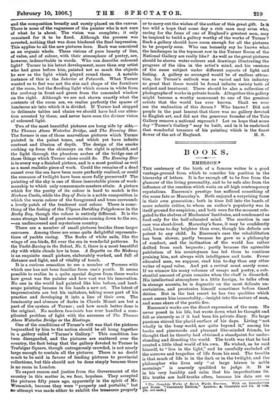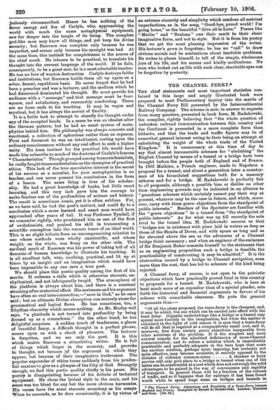BOOKS:
EMERSON.* THE centenary of the birth of a famous writer is a gopd vantage-ground from which to consider his position in the hierarchy of letters. It is far enough off to be free from the glamour of the living personality, and to be safe also from the influence of the reaction which waits on all high contemporary reputations. Emerson's prestige has suffered something of the same fate as Macaulay's. Both enjoyed a surprising fame in their own generation; both in time fell into the hands of more eclectic critics, to whom an author's popularity was in itself ground for suspicion; and both were for the moment rele- gated to the shelves of Mechanics' Institutes, and condemned as food only for the half-educated mind. The reaction in one case was short-lived. Macaulay's fame, it may be confidently said, burns to-day brighter than ever, though his defects are patent to any child. In Emerson's case the rehabilitation has been slower, partly because he gave us a philosophy of conduct, and the inclination of the world has rather drifted from such bequests ; partly because the agreeable patriotism of his countrymen has led them to continue praising him, not always with intelligence and taste. Fewer educated men, we suppose, read him to-day than any other writer of equal value. And yet a revival must surely come. If we winnow his many volumes of essays and poetry, a sub- stantial amount of grain remains when the chaff is discarded. His intellectual atmosphere is a little foreign, he talks often in strange accents, he is dogmatic on the most delicate un- certainties, and prostrates himself sometimes before tinsel deities. But in the last resort he has two qualities which must assure him immortality,—insight into the nature of man, and some share of the poetic fire.
Emerson's works are the direct expression of the man. He never posed in his life, but wrote down what he thought and felt as sincerely as if it had been his private diary. No large passions stirred the placid surface of his days. Living " not wholly in the busy world, nor quite beyond it," among his books and pinewoods and pleasant like-minded friends, he thought that he thereby had obtained a standpoint for under- standing and directing the world. The truth was that he had created a little ideal world of his own. He wished, as he said himself, to " live in the light," and he carefully excluded all the sorrows and tragedies of life from his soul. The trouble is that much of life is in the dark or in the twilight, and the philosopher who lives only " at large leisure in noble mornings " is scarcely qualified to judge it. It is in his very lucidity and calm that his imperfections lie. His truths are half-truths often, because his data are so
* The Complete Works of Reeph Waldo Paterson. With an Introduction and Notes. "Centenary Edition." London : A. Constable and Co. 12 vole, [68. net each.]
jealously circumscribed. Hence he has nothing of the fierce energy and fire of Carlyle, who, approaching the world with much the same metaphysical equipment, saw far deeper into the tangle of its being. The complete god-like man may know all things, and yet keep his divine serenity; but Emerson was complete only because he was imperfect, and serene only because his eyesight was bad. At the same time, this instinct for completeness is the source of his chief merit. He labours to be practical, to translate his thought into the current language of the world. If he fails, consequently, to be a great seer, he is a most admirable teacher.
He has no love of wanton destruction. Carlyle destroys faiths and institutions, but Emerson builds them all up again on a sober, decent, republican basis. He never forgot that he had been a preacher and was a lecturer, and the medium which be had discovered dominated his thought. He must provide his audience with a "message," and that message must be four- square, and satisfactory, and reasonably comforting. There are no loose ends to his teaching. It may be vague and mystical, but it has always the accent of finality.
It is a futile task to attempt to classify his thought under any of the accepted heads. In a sense be was an idealist after the German pattern, but he had no exact system of meta- physics behind him. His philosophy was always concrete and emotional, a collection of aphorisms rather than an organon. First and foremost he was an intuitionist, resting upon the ordinary consciousness without any real effort to seek a higher unity. His keen instinct for the practical life would have made him subscribe to much of the doctrine of Carlyle's famous " Characteristics." Though grouped among transcendentalists, he really fought transcendentalism as the champion of practical ethics. This lack of the true speculative interest is the secret of his success as a moralist, for your metaphysician is no teacher, and can never present his conclusions in the form of a lesson. The same thing is true of his scholar- ship. He had a great knowledge of books, but little exact learning, and this very lack gave him the courage to make fearless use of the profundities of science and history. The result is sometimes comic, yet it is often sublime. For as we have said, he had the poet's instinct, and could fly to a conclusion which a more learned and exact man would have approached after years of toil. It was Professor Tyndall, if we remember rightly, who proclaimed him as one of the first of evolutionists, and praised his skill in transmuting a scientific conception into the warmer tones of an ideal world. This is no slight tribute from an uncompromising scientist to one whose methods were wholly unscientific, and whose weight, on the whole, was flung on the other side. The cardinal merit of Emerson was his power of taking toll of all domains of human knowledge to illustrate his teaching. It is all excellent talk, wise, soothing, practical, and lit up at times by an insight and an imagination which would have been impossible to any one save a true poet.
We should place this poetic quality among the first of his merits. It redeems a style which is otherwise staccato, un- rhythmical, and not infrequently turgid. The atmosphere of the platform is always about him, and there is a constant straining after oratorical effect. His sentences and his argument have often no real interconnection,—" save in God," as he once said ; but an ultimate Divine absorption can scarcely atone for grammatical and logical flaws. He has sometimes, too, a Sibylline obscurity which means nothing. As Mr. Morley well says, "a platitude is not turned into profundity by being dressed up as a conundrum." On the other hand, he has delightful surprises. A sudden touch of tenderness, a gleam of beautiful fancy, a difficult thought in a perfect phrase, comes upon us with a shock of pleasure. The lecturer is forgotten, and we see only the poet. It is this which makes Emerson a stimulating writer. He is full of things which linger in the memory, and provoke to thought, not because 'pf the argument in which they appear, but because of their imaginative irrelevance. The popular expounder of ethics turns suddenly from his pruden- tial maxims to give us a glimpse of the City of God. Strangely enough, we find this poetic quality chiefly in his prose. His poetry is disappointing because of his defects of technical equipment. He chose the lyrical style in the main, and his sense was too blunt for any but the more obvious harmonies His verses have the same staccato monotony as his essays. When he succeeds, as he does occasionally, it is by virtue of an extreme sincerity and simplicity which condone all metrical imperfections, as in the song, " Good-bye, proud world ! I'm going home," or the beautiful " Give all to Love." Poems like " Merlin " and " Brahma " owe their merit to their sheer imaginative force, and not to style. But it is from his poetry that we get the most pleasing impression of the writer. His lecturer's gown is forgotten; he has no "call" to draw obvious morals and be sententious about insoluble problems. He writes to please himself, to tell of the simple, wholesome joys of his life, and his serene and kindly meditations. No man who looked out on life with such clear, charitable eyes can be forgotten by posterity.











































 Previous page
Previous page